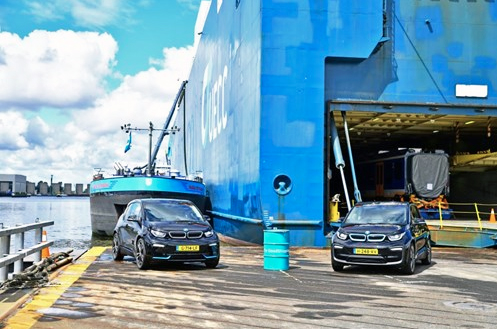After having announced their three-month biofuel trial, leading short-sea shipowner United European Car Carriers (UECC) and the GoodShipping Program have now partnered with premium car manufacturer BMW Group to continue to test marine Bio Fuel Oil (BFO) on UECC’s “roll on, roll off’ (RORO) car carrying vessels. BMW Group joins UECC and the GoodShipping Program in the previously announced trial, where BFO is being tested on UECC’s 140m, 2,080-vehicle carrier M/V Autosky.
By covering the fuel premium for a biofuel volume corresponding to BMW Group’s freight that will be shipped on the Autosky during the trial period, BMW Group will be able to claim a CO2 emission reduction of 80 to 90% for these shipments, totaling more than 400 tons of carbon.
This is a significant and important step towards achieving a carbon-neutral supply chain for BMW, and is the core aim of the GoodShipping Program, which enables cargo owners to reduce their environmental footprint.
BMW Group’s participation in the project marks yet another significant step in the advancement of marine biofuel and climate friendly vehicle transportation, and contributes to enabling the continuation of biofuel deliveries to UECC after the trial period.
The first volume of biofuel was delivered to M/V Autosky on 16-March-2020 in the Port of Rotterdam. The trial will see subsequent further refueling operations between March and July 2020. M/V Autosky is currently testing BFO on the route between Zeebrugge, Belgium and Santander, Spain.
The BFO – based on cooking oil – being used for this trial was supplied by the leading biofuel company GoodFuels. The marine biofuel ‘drops in’ to normal fuel tanks is virtually sulfur oxide (SOx) free and delivers 80% to 90% well-to-exhaust CO2 reduction versus fossil equivalents. The joint trial proves that the means to reduce the carbon footprint of transporting goods and vehicles around the world already exist on the market and that second-generation advanced biofuels can be scaled to meet this demand.
With this scalability, marine biofuel effectively allows shipowners and operators to comply with both new legislation around sulphur content for marine fuels, as well as future regulations on carbon reduction by 2030 and 2050. Thus, the announcement marks an important milestone towards the decarbonization of ocean freight.
Sea transportation and logistics play an important role for the BMW Group, which has production sites and vehicle distribution processes worldwide. When considering the carbon impact across the entire value chain of a car, the participation in this three-month trial is a meaningful and immediate means to reduce the CO2 footprint of BMW Group’s transport logistics processes.
Daniel Gent, Energy and Sustainability Manager, UECC, said: “At UECC, we want to support our customers and enable them to make proactive, conscious choices about their cargo transportation. BMW Group’s participation to continue our trial on our RORO vessel M/V Autosky should therefore signal to the automotive sector that the means to decarbonize are readily available and that our vessels are equipped to meet this most important of challenges for the shipping industry.”
Anniek Sluis, Growth Captain, The GoodShipping Program, added: “We are delighted to have BMW Group join us for continuing this pioneering trial of marine biofuel within the RORO segment. Transportation logistics have a huge carbon impact, so the leadership shown by BMW Group to proactively take steps to decarbonize – and recognize that solutions are available – should act as a call for others in the sector to join us on this journey.”
The GoodShipping Program requires shippers to commit to a reduction in their sea freight CO2emissions. The initiative works on the premise that, as all CO2 from shipping is emitted into the same atmosphere, the means of mitigating these emissions is equally impactful, regardless of which vessels adopt biofuels over traditional bunker fuels – or the amount of ‘drop in’ biofuel that is added to the fuel tank, as long as it offsets the CO2 costs of transporting participating shippers’ cargo.
The calculation of the original CO2 footprint and the expected Scope Three emission reductions for BMW Group were made in line with the GLEC Framework, a universal method for calculating logistics emissions developed by the non-profit Smart Freight Centre. In the following months, further options for continuing marine biofuel uptake within the RORO segment will be pursued.
UECC is a leading short-sea operator and logistics provider for the transportation of cars, vans and high & heavy cargo in Europe. UECC is owned by Nippon Yusen Kabushiki Kaisha (NYK), one of the world’s largest shipping companies, and by Wallenius Lines of Stockholm, Sweden’s foremost shipping enterprise.
The GoodShipping Program is the first sustainable shipping initiative in the world that offers companies – worldwide and of all sizes – the opportunity to make container shipments less polluting by offering a way to substitute fossil fuels with clean, climate-neutral and truly sustainable fuels.
